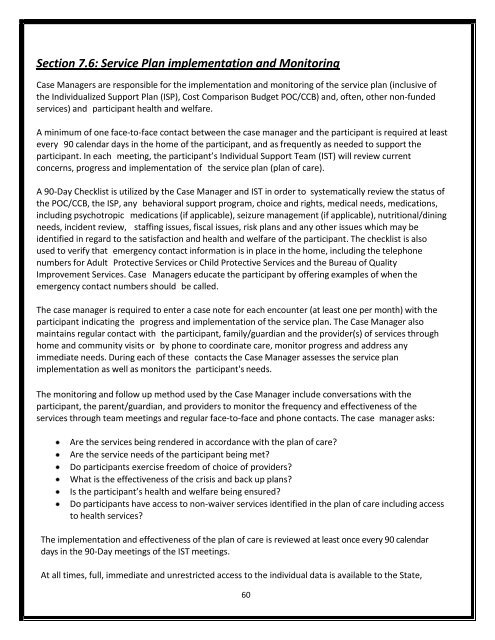DDRS Waiver Manual
2dXf5Pj
2dXf5Pj
You also want an ePaper? Increase the reach of your titles
YUMPU automatically turns print PDFs into web optimized ePapers that Google loves.
Section 7.6: Service Plan implementation and Monitoring<br />
Case Managers are responsible for the implementation and monitoring of the service plan (inclusive of<br />
the Individualized Support Plan (ISP), Cost Comparison Budget POC/CCB) and, often, other non-funded<br />
services) and participant health and welfare.<br />
A minimum of one face-to-face contact between the case manager and the participant is required at least<br />
every 90 calendar days in the home of the participant, and as frequently as needed to support the<br />
participant. In each meeting, the participant’s Individual Support Team (IST) will review current<br />
concerns, progress and implementation of the service plan (plan of care).<br />
A 90-Day Checklist is utilized by the Case Manager and IST in order to systematically review the status of<br />
the POC/CCB, the ISP, any behavioral support program, choice and rights, medical needs, medications,<br />
including psychotropic medications (if applicable), seizure management (if applicable), nutritional/dining<br />
needs, incident review, staffing issues, fiscal issues, risk plans and any other issues which may be<br />
identified in regard to the satisfaction and health and welfare of the participant. The checklist is also<br />
used to verify that emergency contact information is in place in the home, including the telephone<br />
numbers for Adult Protective Services or Child Protective Services and the Bureau of Quality<br />
Improvement Services. Case Managers educate the participant by offering examples of when the<br />
emergency contact numbers should be called.<br />
The case manager is required to enter a case note for each encounter (at least one per month) with the<br />
participant indicating the progress and implementation of the service plan. The Case Manager also<br />
maintains regular contact with the participant, family/guardian and the provider(s) of services through<br />
home and community visits or by phone to coordinate care, monitor progress and address any<br />
immediate needs. During each of these contacts the Case Manager assesses the service plan<br />
implementation as well as monitors the participant's needs.<br />
The monitoring and follow up method used by the Case Manager include conversations with the<br />
participant, the parent/guardian, and providers to monitor the frequency and effectiveness of the<br />
services through team meetings and regular face-to-face and phone contacts. The case manager asks:<br />
Are the services being rendered in accordance with the plan of care?<br />
Are the service needs of the participant being met?<br />
Do participants exercise freedom of choice of providers?<br />
What is the effectiveness of the crisis and back up plans?<br />
Is the participant’s health and welfare being ensured?<br />
Do participants have access to non-waiver services identified in the plan of care including access<br />
to health services?<br />
The implementation and effectiveness of the plan of care is reviewed at least once every 90 calendar<br />
days in the 90-Day meetings of the IST meetings.<br />
At all times, full, immediate and unrestricted access to the individual data is available to the State,<br />
60


